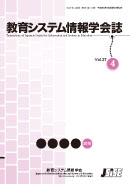Volume 27, Issue 4
Displaying 1-5 of 5 articles from this issue
- |<
- <
- 1
- >
- >|
Preface
-
2010 Volume 27 Issue 4 Pages 299-301
Published: 2010
Released on J-STAGE: July 28, 2018
Download PDF (276K)
Original Papers
-
2010 Volume 27 Issue 4 Pages 302-315
Published: 2010
Released on J-STAGE: July 28, 2018
Download PDF (857K) -
2010 Volume 27 Issue 4 Pages 316-326
Published: 2010
Released on J-STAGE: July 28, 2018
Download PDF (1287K)
Practical Paper
-
2010 Volume 27 Issue 4 Pages 327-336
Published: 2010
Released on J-STAGE: July 28, 2018
Download PDF (1016K)
Community Plaza
-
2010 Volume 27 Issue 4 Pages 337-342
Published: 2010
Released on J-STAGE: July 28, 2018
Download PDF (1879K)
- |<
- <
- 1
- >
- >|
